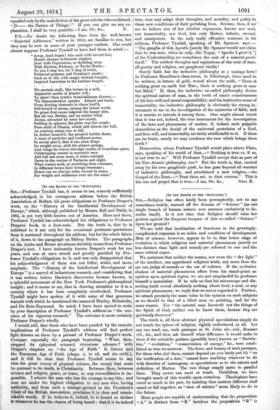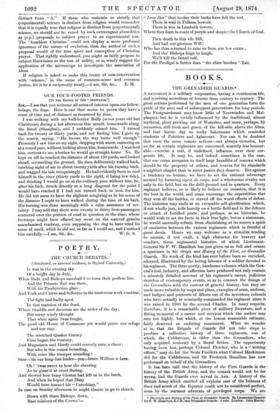[TO THE EDTTOZ OF THE "SPECTATOR:) SIR,—Religion has often lately
been peremptorily, not to say sometimes rudely, warned off the domain of " Science " (as one single branch of human science now assumes exclusively to de- scribe itself). Is it not time that Religion should raise her protest against the frequent trespass of this so-called "Science" upon her gropnd?
We are told that localisation of functions in the growingly- complicated organism is an index and condition of development. Men of science, however, appear to be in that lower stage of evolution in which religious and material phenomena (surely no less distinct than light and sound) are referred to one and the same critical organ.
We maintain that neither the senses, nor even the "dry light" of the intellect, can apprehend religious truth, any more than the eye can judge of sounds or the ear of colours. If the exclusive student of material phenomena offers from his stand-point an opinion upon spiritual topics, we are not surprised•if he professes himself a materialist. If he tells us that his microscope and dis- secting-knife reveal absolutely nothing about God, a soul, or any spiritual phenomena, we reply that we never expected it Further, we attach precisely the same value to his opinion on such subjects as we should to that of a blind man on painting, and for the same reason. For "the natural man knowcth not the things of the Spirit of God, neither can he know them, because they are spiritually discerned."
The. trutla is, all these abstract physical speculations simply do not touch the sphere of religion, rightly understood, at all. Let any one read, say, such passages as St. John xiv.-xvii., Romans
&e., and then ask himself what difference it would make to them if the scientific guesses (possibly true) known as "Darwin- ism," "evolution," "conservation of energy," &c., were estab- lished as true to-morrow. The force and beauty of such passages, for those who feel them, cannot depend (as you lately put it) "on the verification of a date," cannot have anything whatever to do with theories of cosmogony, or speculations as to the nature and definition of Matter. The two things simply move in parallel lines. They never can meet or touch. Doubtless, we have brought much of this trouble upon ourselves. Theologians have erred as much in the past, by insisting that matters different shall stand or fall together, as "men of science" seem likely to do in the future.
Most people are capable of understanding that the proposition "A " is distinct from " B " involves the proposition " B " is distinct from "A." If those who maintain so stoutly that (experimental) science is distinct from religion would remember that it is equally true that religion is distinct from (experimental) science, we should not be vexed by such extravagant absurdities as (e.g.) proposals to subject prayer to an experimental test. The humblest Christian' could not display a more profound ignorance of the nature of evolution, than the author of such a proposal would of the true spirit and conception of Christian prayer. That rightly understood, you might as fairly propose to subject Darwinism to the test of utility, or as wisely suggest the application of the microscope to investigate the association of ideas.
If religion is asked to make this treaty of non-intervention with 'science,' in the name of common-sense and common justice, let it be a reciprocity treaty.—I am, Sir, &c., E. M.































 Previous page
Previous page